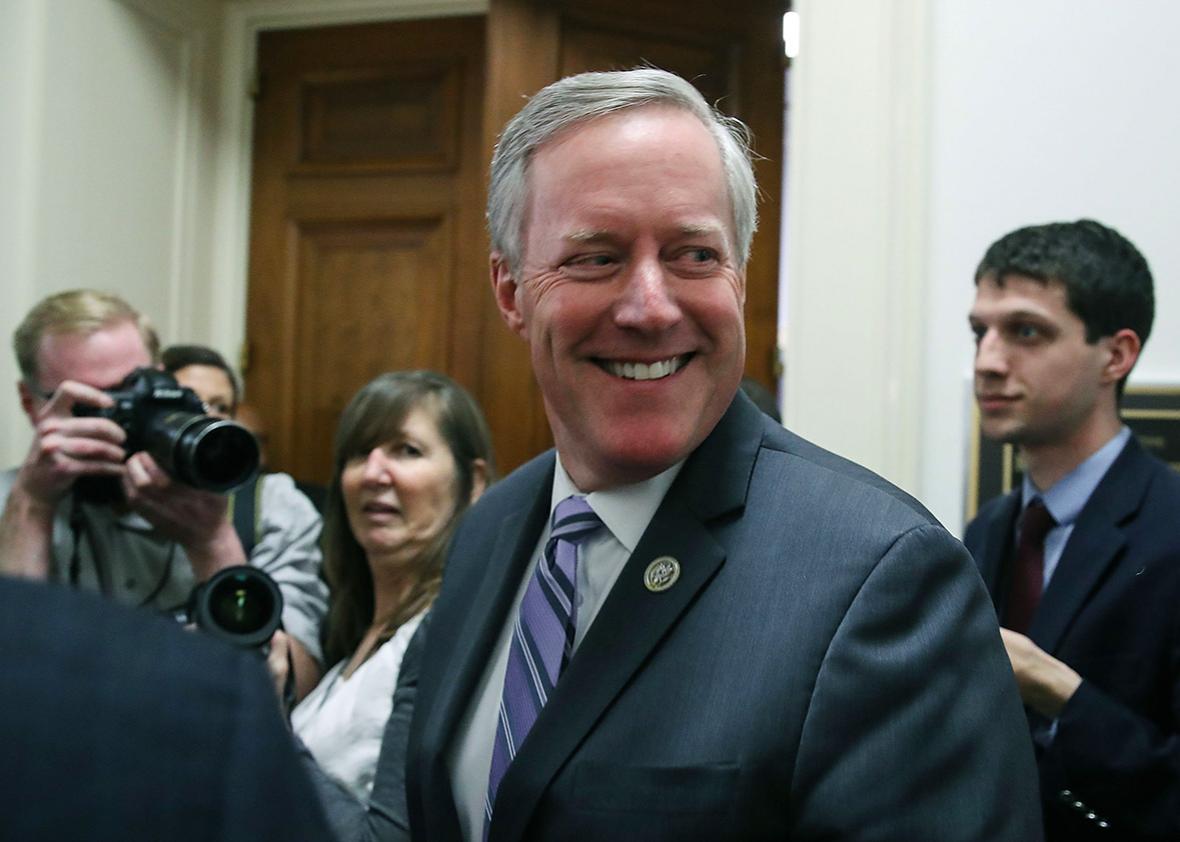The American Health Care Act is showing a pulse. After a week and a half of delicious blame-shifting and guilt-tripping between House Republicans and the White House over the bill’s failure two weeks ago, there’s real movement to revive it.
There’s also no need to get carried away yet: There is still no deal. That will still require moderate and conservative Republicans to arrive at something close to a consensus on health care for, oh, the first time ever. Could it happen? Yes, if the pressure’s strong enough. Should you invest vast sums of borrowed money in the possibility? (Hey, Wall Street!) It’s probably wiser to let it play out.
The outlines of a possible deal broke Monday night as White House officials met with moderates and House Freedom Caucus members in separate meetings. Freedom Caucus members had whittled their demands down to two: removal of the Affordable Care Act’s essential health benefits requirements—a concession they had already won in the last round of negotiations—along with elimination of its community rating provision, which requires insurers to set prices based on where a person lives rather than on an individual’s health status. Since Freedom Caucus members didn’t get community rating removed when the bill collapsed last month, the gesture to remove the essential health benefits failed to earn their votes while scaring off moderates, forcing Speaker Paul Ryan to pull the bill from the floor.
We’re still waiting to see the new text, but the White House has reportedly offered a compromise. It would give each state the option to apply for waivers that would allow them to opt out of both essential health benefit and community rating requirements, so long as the state could prove to the federal government that it wouldn’t worsen the state’s health insurance offerings. The proposal would also direct more money towards funding high-risk pools to cover states’ most vulnerable members.
The Trump administration probably wouldn’t be stingy in handing out these waivers. It’s hard to see, though, how a state could make the case that eliminating its essential health benefits and community rating provisions would improve access to health insurance for those who need it the most. Though the bill would retain the requirement that insurers can’t discriminate against those with pre-existing conditions, those with pre-existing conditions would see sharp increases in their prices if the community rating is waived. An insurer might not be able to turn away sick customers formally. It could, however, price them out of the market. Pre-existing coverage protections would exist in name only.
So the sticking points are: Why would moderates who were already noes goes for this toxic bill now? And is the option of removing these two regulations good enough for conservatives?
New York Rep. Chris Collins, a member of the relatively moderate Tuesday Group and a close ally of President Trump, was in high spirits as he spun the compromise to reporters Tuesday morning outside a House GOP meeting.
The pitch to moderates, per Collins, is that “we’re putting the essential health benefits back in.” This is technically true: Rather than eliminating the essential health benefits requirements, this bill instead would give states the option to eliminate or adjustment them—if the federal government signs off. “And for a state to ask for a waiver on those, they have to also show that where they’re going to be improving coverage and reducing cost,” Collins said. “So it’s not automatic.”
And conservatives, Collins said, “will like that it’s a states’ option” to make the two regulatory changes they were demanding.
It’s true: Conservatives love them some states’ rights. It’s not clear that they view this offer as a pure expression of that, though. While some leading Freedom Caucus holdouts, like Ohio Rep. Jim Jordan and Michigan Rep. Justin Amash, said Tuesday morning that they were still waiting to see the bill text before giving their positions, other members portrayed the offer as patronizing.
“I think it ought to be a matter of right, as opposed to a request on bended knee, to the federal government,” said Alabama Rep. Mo Brooks, a Freedom Caucus member. “It ought to be a state’s right to determine what insurance policies ought to contain within their state boundaries for their state’s citizens.”
“We promised people that we would stop the total usurpation of individual and state’s rights by the federal government,” said Texas Rep. Louie Gohmert, another Freedom Caucus member. “And saying they can ask us for permission doesn’t really seem to be the best way to go about that.”
Not all Freedom Caucus members’ votes would be needed. And some might make the calculation that giving states the option of eliminating both essential health benefits and community rating was an acceptable substitute for eliminating essential health benefits alone.
There are indications, though, that moderates are not sold on giving states the option of waiving community rating. That something is actually a someone: our pal Chris Collins, who said that the community rating option is still “under discussion right now.”
“There are many of us who want to see that community rating stays in” and “not subject to waiver,” Collins said. A reporter pointed out, though, that this was one of the Freedom Caucus’ bottom-line requirements.
“We’ll see how the discussion goes,” he said. “As a betting person, I think they stay in.”
We’ll see, indeed. If the House is able to come together and pass this, the bill will be sent to the Senate—where odds are that it would die, as nearly all bills do. But at least, then, House Republicans could blame the other chamber for Congress’ failure to live up to a key campaign promise, which is what politics is all about.
